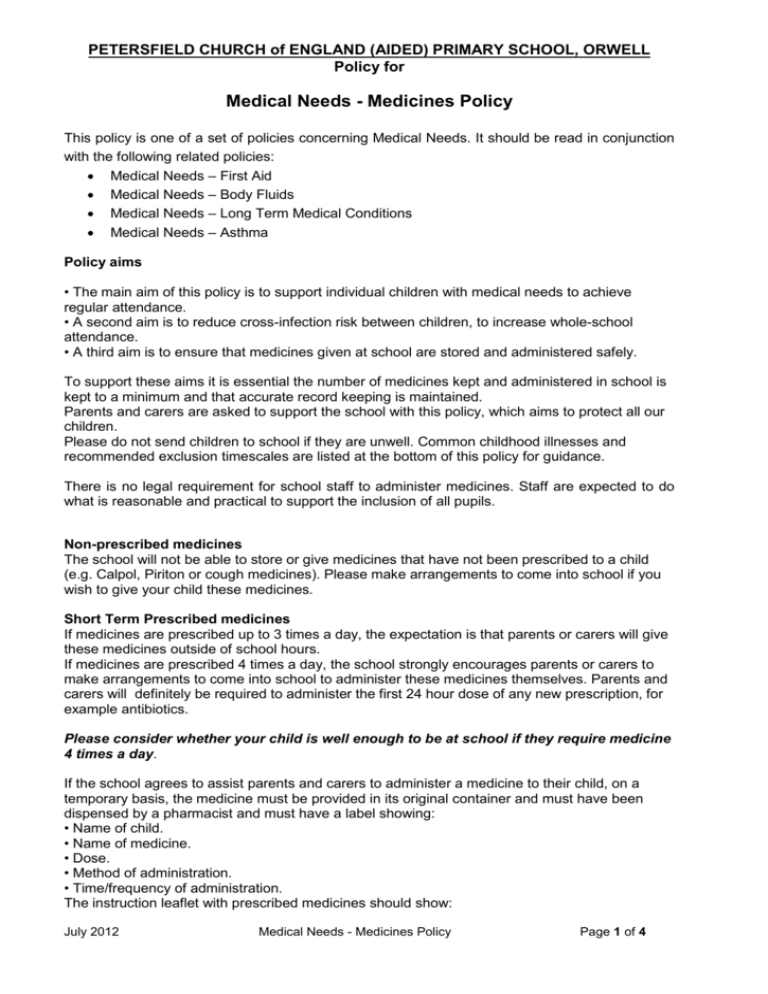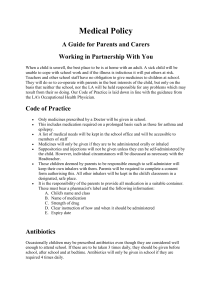Medical Needs - Medicines
advertisement

PETERSFIELD CHURCH of ENGLAND (AIDED) PRIMARY SCHOOL, ORWELL Policy for Medical Needs - Medicines Policy This policy is one of a set of policies concerning Medical Needs. It should be read in conjunction with the following related policies: Medical Needs – First Aid Medical Needs – Body Fluids Medical Needs – Long Term Medical Conditions Medical Needs – Asthma Policy aims • The main aim of this policy is to support individual children with medical needs to achieve regular attendance. • A second aim is to reduce cross-infection risk between children, to increase whole-school attendance. • A third aim is to ensure that medicines given at school are stored and administered safely. To support these aims it is essential the number of medicines kept and administered in school is kept to a minimum and that accurate record keeping is maintained. Parents and carers are asked to support the school with this policy, which aims to protect all our children. Please do not send children to school if they are unwell. Common childhood illnesses and recommended exclusion timescales are listed at the bottom of this policy for guidance. There is no legal requirement for school staff to administer medicines. Staff are expected to do what is reasonable and practical to support the inclusion of all pupils. Non-prescribed medicines The school will not be able to store or give medicines that have not been prescribed to a child (e.g. Calpol, Piriton or cough medicines). Please make arrangements to come into school if you wish to give your child these medicines. Short Term Prescribed medicines If medicines are prescribed up to 3 times a day, the expectation is that parents or carers will give these medicines outside of school hours. If medicines are prescribed 4 times a day, the school strongly encourages parents or carers to make arrangements to come into school to administer these medicines themselves. Parents and carers will definitely be required to administer the first 24 hour dose of any new prescription, for example antibiotics. Please consider whether your child is well enough to be at school if they require medicine 4 times a day. If the school agrees to assist parents and carers to administer a medicine to their child, on a temporary basis, the medicine must be provided in its original container and must have been dispensed by a pharmacist and must have a label showing: • Name of child. • Name of medicine. • Dose. • Method of administration. • Time/frequency of administration. The instruction leaflet with prescribed medicines should show: July 2012 Medical Needs - Medicines Policy Page 1 of 4 PETERSFIELD CHURCH of ENGLAND (AIDED) PRIMARY SCHOOL, ORWELL • Any side effects. • Expiry date. The school will provide Short Term Medication Request form, and parents/carers must complete and sign one of these forms if they leave medicine at school. Before administering any medication, the member of staff involved will always check the Administration of Medicines Book to ensure that the required dose has not already been given. Once the medication has been given, the person administering the dose completes the Administration of Medicines Book with the appropriate information, including child’s name, dosage given, date and time the medication was administered and signature. Note: For controlled schedule 2 drugs, for example Ritalin, legal guidelines are followed. Long Term Prescribed Medication Long term medication applies to medication that must be given over a long period of time or medication that must be stored at school in case it is required, for example asthma inhalers or Epipens. Parent/s or carers must complete a Long Term Medication Request form for every medicine. This form contains details such as child’s name, dosage, times and dates medication should be administered (if appropriate). Long term medication requirements are accompanied by a Care Plan/Protocol, for example those children who may require the use of an Epipen. All Care Plans are discussed and produced with involvement from the parent/s or carers. In addition, a named member of staff will receive any necessary additional information and/or training. It is current practice that all staff are trained in the use of Epipens. For other conditions such as epilepsy the school nurse or parent/s or carers may come into the school to give a talk on the condition to staff and possibly class mates. All long term medication requirements must be reviewed annually in September. This ensures that information is kept up–to-date and that new class teachers and teaching assistants will be informed as necessary. Whenever medication has been given, the person administering the dose must complete the Administration of Medicines Book with the appropriate information, including child’s name, dosage given, date and time the medication was administered and signature. The parent/s or carers are informed if this is not a routine dose. Each class register includes details of the medical needs of the children in the class. For educational visits of any duration, all medication is taken. Note: For controlled schedule 2 drugs, for example Ritalin, legal guidelines are followed. July 2012 Medical Needs - Medicines Policy Page 2 of 4 PETERSFIELD CHURCH of ENGLAND (AIDED) PRIMARY SCHOOL, ORWELL Self-Management Children are encouraged to take responsibility for their own medicine from an early age. A good example of this is children using their own asthma reliever. Parents/carers must still complete a Long Term Medication Request form, noting that the child will self-administer and sign the form. The school will store the medicine appropriately. Refusing Medicine When a child refuses medicine the parent or carer will be informed the same day. Storage and Disposal of Medicine All medicines are stored in the School office and refrigerated if necessary. Controlled drugs are kept in a locked cupboard. Medicines that have not been collected by parents at the end of each term will be safely disposed of. Emergency treatment and medicine administration The school will call for medical assistance and the parent or named emergency contact will be notified. The Governing Body will support and the LA will indemnify any member of staff who has been trained, who assists with medicine in a reasonable good faith attempt to prevent or manage an emergency situation, regardless of outcome. Due for Review : 2015 Full consideration has been given to Equality, inclusion and Safeguarding (child protection) in the preparation of this policy. School illness exclusion guidelines attached. July 2012 Medical Needs - Medicines Policy Page 3 of 4 PETERSFIELD CHURCH of ENGLAND (AIDED) PRIMARY SCHOOL, ORWELL School illness exclusion guidelines Please check your child knows how to wash his/her hands thoroughly, to reduce risk of ross infection. School attendance could be improved for all if children and families wash and dry their hands well 5 or more times a day. Disease Chickenpox Conjunctivitis (Pink Eye) Nausea Food Poisoning/Sickness Diarrhea and/or vomiting German Measles / Rubella Hand, food and mouth disease Head Lice Cold Sores Impetigo Measles Mumps Ringworm Scabies Scalatina Severe sore throat Slapped Cheek Threadworms Whooping Cough Viral infections July 2012 Advice & Minimum Period of Absence from school 6 days from onset of spots and until scabs are dry Until appropriate treatment has been given and condition has significantly improved. Nausea without vomiting. Return to school 24 hours after last felt nauseous. Until free of sickness and diarrhea for 24 hours, then 2 more days. Please check your child understands why they need to wash and dry hands frequently. Exclusion from swimming for two weeks. 5 days from onset of rash . Advice school immediately as any pregnant staff member would need to be informed. Until all blisters have crusted over. No exclusion from school if only have white spots. No exclusion, but please wet-comb thoroughly for first treatment, and then every three days for next 2 weeks to remove all lice. Only exclude if unwell. Encourage hand- washing to reduce viral spread. 48 hours after antibiotic treatment has started and after the sores have stopped blistering or crusting 7 days from onset of rash 5 days after swelling appears and until swelling has subsided Until treatment has commenced Your child can return to school once they have been given their first treatment although itchiness may continue for the 3-4 weeks. All members of the household and those in close contact should receive treatment. For 5 days until rash has disappeared or 5 days of antibiotic course has been completed. Until appropriate treatment has been given and condition has significantly improved. No exclusion(Infectious before rash) No exclusion. Encourage hand washing including nail scrubbing. 21 days from onset of cough Exclude until child is well and temperature is normal(37 degrees) Medical Needs - Medicines Policy Page 4 of 4

